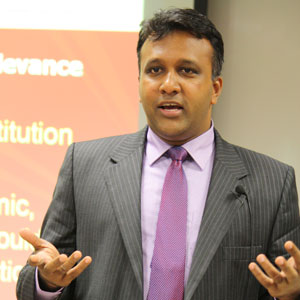Information
Venue
Start
End
26 September 2011 | CIL Seminar
Corruption as a Violation of Human Rights: India’s Challenges to Establish a Rule of Law Society
Introduction
 Corruption violates human rights, undermines the rule of law, distorts the development process, and dis-empowers the Indian state. While there are laws against corruption in India, the gap between the law in the books and the law in practice is wide. Corruption violates human rights of the people of India as it hinders the process of fulfilling civil, political, economic, social and cultural rights. The unequal application of law leading to selective enforcement due to corruption creates an environment of scant regard for law, legal institutions and judicial process. Corruption in India creates an environment whereby some people are given privileges due to their ability to pay bribes. A rule-of-law society is based upon the trust and faith of the people that they are governed on the basis of laws enforced in a fair, just, and reasonable manner. Corruption in India undermines this basic trust.
Corruption violates human rights, undermines the rule of law, distorts the development process, and dis-empowers the Indian state. While there are laws against corruption in India, the gap between the law in the books and the law in practice is wide. Corruption violates human rights of the people of India as it hinders the process of fulfilling civil, political, economic, social and cultural rights. The unequal application of law leading to selective enforcement due to corruption creates an environment of scant regard for law, legal institutions and judicial process. Corruption in India creates an environment whereby some people are given privileges due to their ability to pay bribes. A rule-of-law society is based upon the trust and faith of the people that they are governed on the basis of laws enforced in a fair, just, and reasonable manner. Corruption in India undermines this basic trust.
The talk focused on the relationship between corruption and human rights and to what extent domestic law, international law, including human rights ought to influence national efforts in the fight against corruption. The presentation critically examined from a comparative and international law perspective the legal and institutional approaches in the fight against corruption, and the growth and development of the right to information in India for creating greater transparency and accountability in governance. The talk will discuss the contemporary civil society initiatives and social movements in India to develop legislative measures and independent institutional mechanisms, including the establishment of an independent commission against corruption (ICAC) similar to that of Hong Kong and Singapore to eliminate corruption.
About the Speaker
Professor Dr C Raj Kumar is the Vice Chancellor of O.P. Jindal Global University and the Dean of the Jindal Global Law School. He was a Rhodes Scholar at the University of Oxford, UK, where he obtained his Bachelor of Civil Law (B.C.L.) degree; a Landon Gammon Fellow at the Harvard Law School, USA, where he obtained his Master of Laws (LL.M.) degree and a James Souverine Gallo Memorial Scholar at the Harvard University. He was awarded the Doctor of Legal Science (SJD) by the University of Hong Kong. He also obtained a Bachelor of Laws (LL.B.) degree from the University of Delhi, India; and a Bachelor of Commerce (B.Com.) degree from the Loyola College of the University of Madras, India.
Professor Kumar’s areas of specialisation, include, human rights and development, terrorism and national security, corruption and governance, law and disaster management, comparative constitutional law and legal education. He has over hundred publications to his credit and has published widely in journals and law reviews in Australia, Hong Kong, India, Japan and USA, some of which are the American University International Law Review, Asia Pacific Law Review, Australian Journal of Asian Law, Columbia Journal of Asian Law, Corporate Governance International, Denver Journal of International Law & Policy, Hong Kong Lawyer, Human Rights Quarterly, Indian Journal of Criminology, Indian Journal of Public Administration, ILSA Journal of International & Comparative Law, Journal of the International Peace Research Institute, Loyola of Los Angeles International and Comparative Law Review, Michigan State Journal of International Law, New England Journal of International and Comparative Law, Proceedings of the American Society of International Law, San Diego International Law Journal, Tulane Journal of International and Comparative Law, and Tulsa Journal of Comparative and International Law. He has authored and edited four books: CORRUPTION AND HUMAN RIGHTS IN INDIA: COMPARATIVE PERSPECTIVES ON TRANSPARENCY AND GOOD GOVERNANCE (2011) published by the Oxford University Press; HUMAN RIGHTS AND DEVELOPMENT: LAW, POLICY AND GOVERNANCE (2006) (edited) published by LexisNexis, Butterworths; TSUNAMI AND DISASTER MANAGEMENT: LAW AND GOVERNANCE (2006) (edited) published by Sweet & Maxwell Thomson; and HUMAN RIGHTS, JUSTICE AND CONSTITUTIONAL EMPOWERMENT (2007) (edited) published by the Oxford University Press (OUP).


